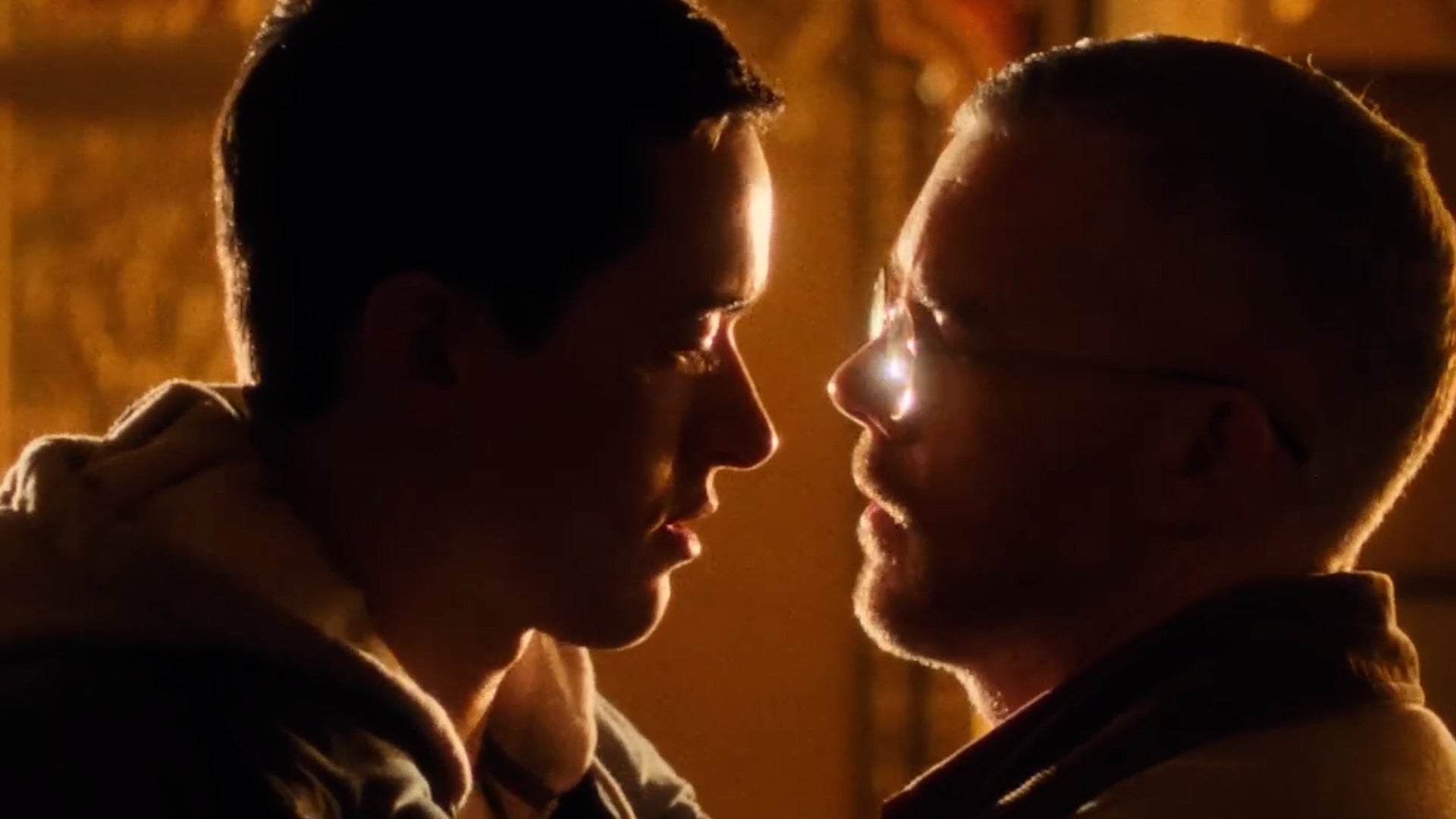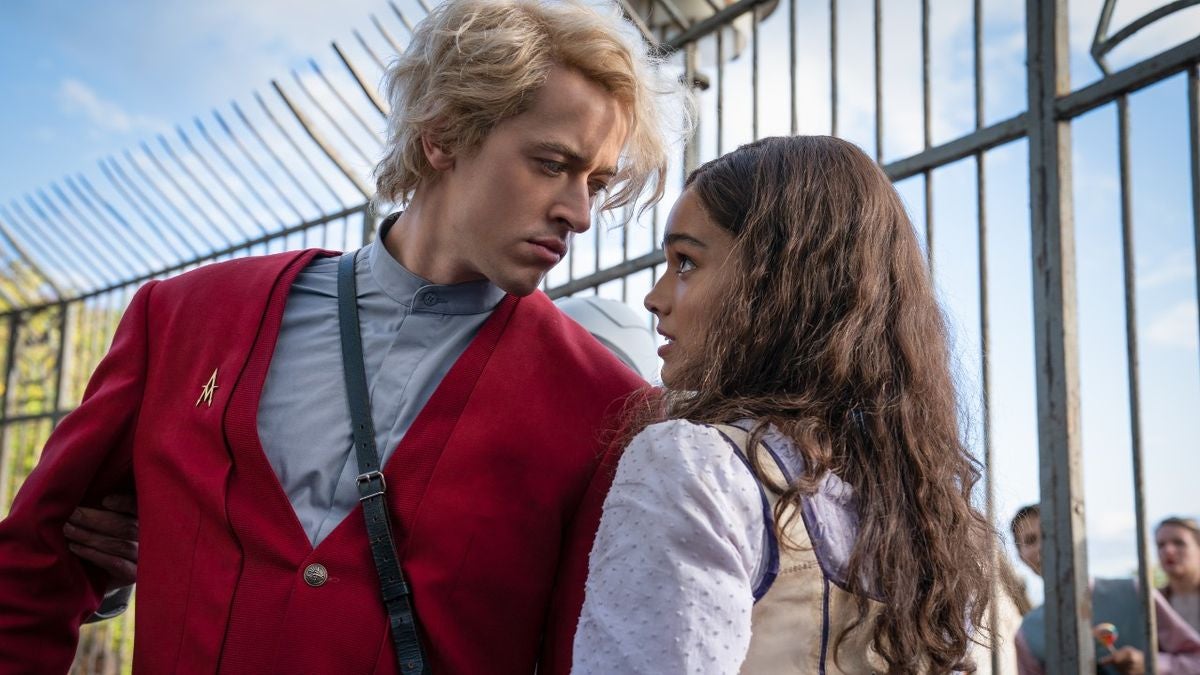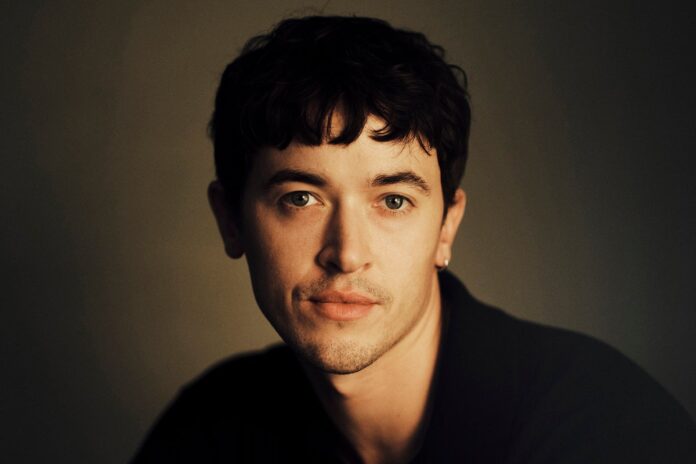Tom Blyth is about to get extremely popular. In a few months’ time, the British actor’s steely blue eyes and tousled Caesar haircut will be beamed into living rooms across the world as Netflix’s latest streaming heartthrob. People We Meet on Vacation is based on the romcom bestseller by Emily Henry, and will inevitably take Blyth’s fame stratospheric. But Blyth himself doesn’t seem remotely phased. “It’ll probably last five minutes,” he shrugs. “Then I’ll be back to walking my dog.”
The fleeting nature of things is a recurring topic when I meet the 30-year-old in central London. He’s fresh off the Eurostar from Paris Fashion Week – he was a special guest at YSL’s show – but even the excitement of that glitzy environment was brief. “You’re in this elite world for about five minutes and then you step back into real life,” he tells me. And when we discuss the resulting fanfare of headlining one of 2o23’s biggest blockbusters – the action prequel The Hunger Games: The Ballad of Songbirds & Snakes – he says it was short-lived, and “calmed down very quickly”.
Blyth is remarkably bashful considering he’s becoming one of Britain’s most in-demand young actors. The proof is in the pudding – he’s currently promoting four upcoming projects at once. He’s just been in Toronto talking up The Fence – his new drama with the celebrated French auteur Claire Denis – and is due at London Film Festival this month to launch his gritty prison movie Wasteman. Then in January there’s People We Meet…, while today we’re discussing Plainclothes, a romantic thriller that marks his most complex work to date. He arrives wearing a slick black leather jacket, dark jeans and black cowboy boots, and there’s a buoyant energy about him: he’s a big knee-slapper and finger-clicker throughout conversation, like a one-man band making music with his limbs.
In Plainclothes, Blyth is Lucas, a young, closeted cop serving as an undercover policeman for the NYPD in the 1990s. Lucas is tasked with luring gay men into public bathrooms and arresting them for public indecency. The operation becomes an emotional minefield, though, as a conflicted Lucas finds himself drawn to one particular man: a closeted priest played by Russell Tovey. Blyth is brilliant in the film: quiet, timid and affecting, a feat made even more impressive considering Lucas is practically silent through much of the film.
Blyth is proud of Plainclothes. When he accepted the role, he was aware of the historical practice of police entrapment, which involves inciting someone to commit a crime they would otherwise not commit. But he didn’t realise it’s a very modern practice, too: there are cases that have occurred as recently as this year. “The NYPD have targeted people using gay dating apps, and [identified] people cruising in public in New York and then entrapping them,” he says passionately. “It’s very prevalent. It’s happening right now, especially [under] the current US administration.” The film, then, is more timely than ever. “I feel like we’ve made something that is vital, but it’s also sad – I wish we didn’t have to tell this story.”
It’s just such a harsh world out there, especially for a young woman doing what we do. Rachel Zegler takes it on the chin like a champ
Blyth found playing Lucas extremely taxing. When it came to his performance, he struggled to separate his own feelings from his character’s. “I’m usually quite good at trying to be healthy about [the work],” he says. “I’ll go home and do something else to take my mind off it. But because Lucas is in such a state of anxiety – both because he’s hiding himself and his sexuality from his family, and also hiding himself as an undercover cop – I was going home to my little hotel room and feeling quite stressed. I carried this anxiety that I don’t usually carry.”
Method acting isn’t for him, he says. “You shouldn’t have to take it all the way home with you to your friends and family.” But sometimes you just can’t help it. “If you’re putting yourself in a certain state every day or a certain mindset, automatically your body absorbs it and holds onto the trauma that you’re putting yourself through. I was not getting enough sleep, and that’s what [Lucas] is going through in the film. We were kind of living parallel lives.”

Plainclothes reminded Blyth of why he got into acting in the first place. “What you do for a living is not just being a clown for hire, you know?” he laughs. “There’s more to it than that.” It was a smaller set than he’s been used to lately. To put it into perspective, The Ballad of Songbirds & Snakes cost reportedly 100 times the $1m budget of Plainclothes. “Everyone got stuck in, carrying the bags and boxes to the cars,” he remembers. “That stuff doesn’t happen on bigger sets”.
The Ballad of Songbirds & Snakes taught him not to become fixated on the buzz surrounding new releases. “In this age of social media, everything’s hot for a minute and then the next thing comes out,” he says, his legs crossed as he leans back into his chair. “It taught me really quickly not to buy into [things] too much. And I’m glad it happened when I was 27 and not when I was 19 or 20. I was like, ‘I know why I do this. It’s not for the attention. It’s for the love of it.’”
What’s been less ephemeral, though, is his close friendship with his Songbirds & Snakes co-star Rachel Zegler, who Blyth says is “like a little sister” to him. I ask about the various public backlashes Zegler has faced in recent months – she has been vocal about her views on Israel and Palestine, on racism, feminism and Trump voters, and has experienced waves of trolling and criticism as a result. Blyth says that she’s taken it all in her stride. “It’s just such a harsh world out there, especially for a young woman doing what we do,” he says. “She takes it on the chin like a champ. To see her kind of put her middle finger up by just doing really good work … People can’t deny her talent. I’m proud of her.”
While Blyth isn’t politically outspoken like Zegler, I wonder if he feels any pressure to vocalise his opinions online (after all, he has a million followers on Instagram). He prefers to keep his cards close to his chest. “I’m political, and very active and vocal, in my personal life,” he says decisively. “I don’t always talk about it when it comes to work. I’m not always asked, but I wouldn’t shy away from it. I think my job is to be an actor and while not everyone needs to be shouting their views from the rooftops all the time, I do it in my day-to-day life.”

Born in Birmingham and later growing up in Nottingham after his parents divorced, Blyth trained at the Nottingham Television Workshop and then at the National Youth Theatre. He secured his first screen credit at the age of 14, playing a feral child in Ridley Scott’s Robin Hood in 2010. That same year, Blyth lost his father, a journalist and photographer who died of Non-Hodgkin lymphoma. Blyth has said in previous interviews that he was “angry at the world and at myself” following his father’s death. It also shaped who he became.
In the final years of his life, Blyth’s father began working in the TV industry, as a producer and story editor on Coronation Street and Emmerdale, but he didn’t get a chance to pursue his dream of working in film. Life is fleeting, after all. “I never got to watch him really fulfill what he wanted to do,” Blyth says. “It made me want to pick up that mantle and kind of do it for both of us.”
He nods, softly.
“I keep hold of that when things have been tough. I think, ‘I’m doing it for me, and my dad.’”
‘Plainclothes’ is in cinemas



